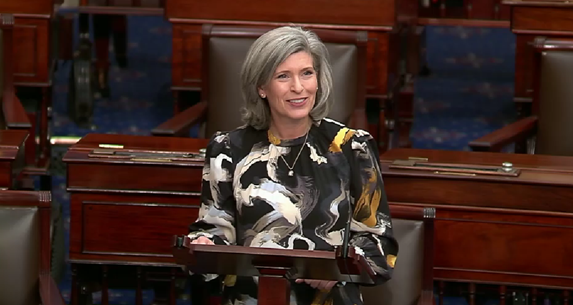Ernst Remembers Colonel Ralph Puckett
WASHINGTON – U.S. Senator Joni Ernst (R-Iowa) today spoke on the Senate floor to honor the life and legacy of her mentor and Medal of Honor recipient, Colonel Ralph Puckett, after he passed away at the age of 97.
This week, following Ernst’s advocacy, Col. Puckett was fully honored in the Capitol rotunda.

Click here to watch.
Ernst’s full remarks:
“Typically, legends emerge long after the individuals or events they commemorate have passed into history.
However, the legend of Colonel Ralph Puckett was present among us for decades.
Ralph Puckett, Jr. was a giant of a man in his accomplishments, duties, and passion.
He started on his journey into legendary history when he graduated from West Point in 1949, commissioning as an Infantry officer.
Following the outbreak of the Korean Conflict in 1950, Lieutenant Puckett volunteered to command the newly created Eighth Army Ranger Company.
This freshly minted lieutenant was charged with turning non-infantry soldiers into battle-ready Rangers in only five and a half weeks.
And to no one’s surprise, he did it.
On November 25, 1950, the Rangers dismounted their vehicles under heavy fire and secured Hill 205 against an onslaught of North Korean fighters, who outnumbered them nearly ten to one.
Lieutenant Puckett was instrumental in this effort.
He called in supporting artillery fires dangerously close to his position.
He intentionally exposed himself on six occasions, allowing the enemy force to focus on him, while enabling his men to locate and kill the enemy.
Lieutenant Puckett was wounded twice in this battle.
But he refused to be evacuated and, instead, chose to continue to lead his men while they repelled five consecutive counterattacks.
It wasn’t until the sixth counterattack, with supporting artillery fires unavailable and in the face of almost certain death, that Lieutenant Puckett ordered his men to leave him behind due to his injuries and the chaos surrounding the close quarters fighting.
Instead of leaving their Commander, two Rangers fought their way to Lieutenant Puckett and drug him to safety.
For his actions, he was awarded the Distinguished Service Cross.
Following the battle that nearly cost Lieutenant Puckett his life, he was sent to Fort Benning, Georgia for recovery.
There he met his future bride, Miss Jeannie Martin.
They would later be married on November 26, 1952, the second anniversary of the battle.
Instead of retiring from military service, Lieutenant. Puckett chose to serve as a combat arms officer at the U.S. Army Ranger School.
In 1967, Lieutenant Colonel Puckett volunteered for a tour in Vietnam, where he once again led soldiers in combat, most notably during the Tet Offensive.
In 1971, after 22 years of service, Colonel Puckett retired from active duty.
But that was not the end of Colonel Puckett’s service.
When he and his family moved to Georgia in 1990, he devoted much of his time to speak on base and teach leadership courses.
He also participated in numerous field training exercises and visited soldiers serving around the world to pass on the leadership and life lessons he learned during his multiple combat tours.
Colonel Puckett’s influence extended to virtually every senior infantry officer and non-commissioned officer who served at Fort Benning, now Fort Moore, or within the 75th Ranger Regiment, for nearly two decades.
However, his mentorship wasn't limited to the men and women at the senior ranks; it resonated across all levels of the military.
Between his leadership while on active duty and mentorship after he retired, Colonel Puckett influenced generations of servicemembers, including me.
I was fortunate enough to meet Colonel Puckett when I worked on Fort Moore in the 1990s.
When I was deployed in support of Operation Iraqi Freedom from 2003 to 2004, Colonel Puckett, who had become a mentor, would write me with words of advice and motivation.
For a man of his stature and legacy to spend this time mentoring a young captain on deployment is one small example of the character and tireless devotion of Colonel Puckett.
Rightly so, Colonel Puckett was an inaugural inductee into the U.S. Army Ranger Hall of Fame.
He would go on to be the Honorary Colonel of the 75th Ranger Regiment from 1996-2008.
And on May 21, 2021, Colonel Puckett’s Distinguished Service Cross was upgraded to the Medal of Honor in a White House ceremony, that I was fortunate to attend.
Mr. President, Colonel Puckett lived a life of devoted service to our nation.
His military awards include the Medal of Honor, the Distinguished Service Cross, two Silver Stars, three Legions of Merit, two Bronze Stars with V device for valor, and five Purple Hearts.
In addition, he has the Combat Infantryman’s Badge with star, Special Forces Tab, and Ranger Tab.
Colonel Puckett was a legend – a legend of a man, a legend of a soldier, a legend of a Ranger, a legend of a husband, father, and grandfather, and a legend of a citizen who knew no limits to serving his country.
After a literal lifetime of dedication and service to America, it is only fitting that we pay tribute to Colonel Puckett in the Rotunda of the Capitol to honor his sacrifices, and the sacrifices of the Silent Generation and the more than 5,700,000 men and women who served in the Armed Forces of the United States during the ‘Forgotten War.’
This country is forever in your debt for answering the call to fight against tyranny and oppression in the Korean Conflict.
Mr. President, I ask that we take a moment of silence in memory of Colonel Puckett and the contributions he made both in and out of uniform, and to acknowledge the sacrifices his family made when Colonel Puckett’s duties took him away from home.
It has been a privilege and an honor to know such a man and to have walked in the footsteps of giants who have come before, giants such as Colonel Ralph Puckett, Jr.
May he rest in peace.
Rangers Lead the Way!”
###
